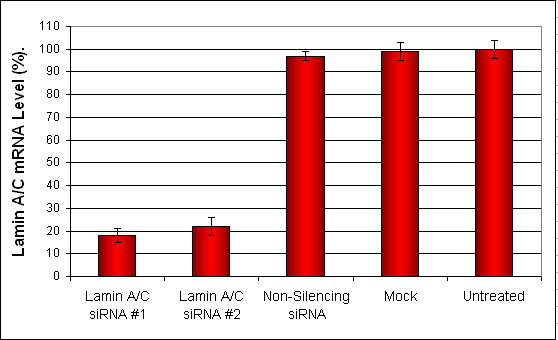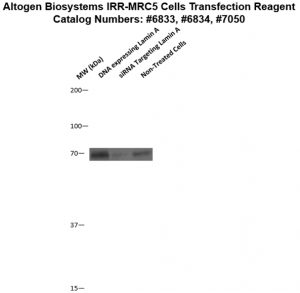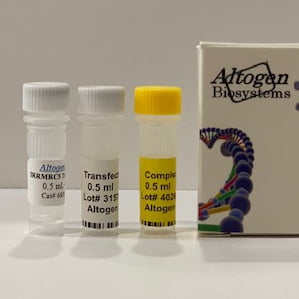Description
Purchase Orders: Click “Add to Cart” button to order, then email PO to orders@altogen.com.
Product Availability: In Stock.
Transfection Reagent for IRR-MRC5 Cells (Irradiated Fibroblast Cells, 55-X)
- Proprietary cationic lipids formulation
-
High transfection efficiency of small RNA (siRNA, shRNA, miRNA), mRNA, pDNA
-
Work in the presence of serum
-
A proven reagent for establishing stable cell lines
-
Optimized transfection protocols are adapted for use with both standard & reverse transfection methods
-
Download in vitro IRR-MRC5 transfection protocol: [PDF]
- Download IRR-MRC5 CRISPR/Cas9 transfection protocol: [PDF]
- Download PowerPoint presentation for IRR-MRC5 cells transfection kit: [PPT]
- UPC/GTIN/EAN: 860002089779
-
Brand: ALTOGEN®, developed and manufactured by Altogen Biosystems
Transfection Efficiency:
Reagent exhibits at least 73% transfection efficiency of siRNA delivery. Transfection efficiency was determined by qRT-PCR.
Transfection Protocol and MSDS:
Download Altogen Biosystems IRR-MRC5 Transfection Protocol: [PDF]
Download MSDS: [PDF]
IRR-MRC5 Cell Line:
IRR-MRC5 cells are notable for their stable karyotype, low mutation rate, and ability to undergo a limited number of cell divisions before entering replicative senescence. They are therefore commonly used to study the mechanisms underlying cellular aging and senescence, including changes in gene expression, telomere length, and DNA damage response pathways. Researchers also use IRR-MRC5 cells to investigate the effects of environmental and genetic factors on cellular function and to identify potential therapeutic targets for various diseases. Feeder cells or layers have been extensively employed to support the growth of various cell types including stem cells, frequently serving as a basal layer for other cultures. Feeder cells comprise cell layers that are unable to divide but can provide extracellular secretions stimulating another cell’s nourishment and proliferation. These cells release growth factor to the culture media to support the growth of target cells. The feeder cells are often irradiated to prevent them from proliferating. The IRR-MRC-5 cell line was established from the lung tissue of a 14-week-old Caucasian male fetus. The “IRR” indicates that they have been irradiated, and therefore will not replicate or divide like other cells as a result. The primary purpose of these cells is to be used to feed and support the growth of other cells. IRR-MRC-5 cells exhibit fibroblast morphology, and on their own, could be useful for studying human embryonic lung tissue. Altogen Biosystems provides lipid-based transfection reagent kits that yield high transfection efficiency with the IRR-MRC-5 cell line, a suitable host for studying mammalian embryonic tissue. IRR-MRC-5 transfection kit is commonly used in research laboratories for gene expression research and pharmaceutical studies.
Data:

Figure 1. siRNAs targeting Lamin A/C mRNA or non-silencing control siRNA were transfected into IRR-MRC5 cells following the recommended protocol. At 48 hours post-transfection the cells were analyzed by qRT-PCR for Lamin A/C gene expression levels. 18S rRNA levels were used to normalize the Lamin A/C data. Values are normalized to untreated sample. Data are means ± SD (n=4).

Figure 2. Protein expression of Lamin A/C in IRR-MRC5 cells. DNA plasmid expressing Lamin A/C or siRNA targeting Lamin A/C were transfected into IRR-MRC5 cells following Altogen Biosystems transfection protocol. At 72 hours post-transfection the cells were analyzed by Western Blot for protein expression levels (normalized by total protein, 10 µg of total protein loaded per each well). Untreated cells used as a negative control.
Altogen Biosystems:
Altogen Biosystems provides preoptimized transfection products for life science research applications. Transfection protocols are optimized for individual cancer cell lines. Altogen Biosystems developed two types of in vivo delivery kits for animal research: Tissue-targeted reagents (delivery to liver, pancreas, and kidney tissues), and broad range in vivo delivery reagents (PEG-Liposome, Nanoparticle-based, Lipid-based, and Polymer-based kits). Advanced formulation of reagents and optimized transfection protocols provide efficient cellular delivery of proteins, DNA, RNA, and any other negatively charged molecules in vitro and in vivo. Read more about transfection technology at Altogen’s Transfection Resource.
Altogen Labs Research Services:
Altogen Labs provides GLP-compliant contract research studies for pre-clinical research, IND applications, and drug development. Biology CRO services include: Xenograft models (90+), development of stable cell lines, ELISA assay development, cell-based and tissue targeted RNAi studies, safety pharm/tox assays, and other studies (visit AltogenLabs.com).
Volume Options:
- 0.5 ml (Catalog #6833)
- 1.5 ml (Catalog #6834)
- 1.5 ml CRISPR (Catalog #2161)
- 8.0 ml (Catalog #7050)
Purchase Orders: Click “Add to Cart” button to order, then email PO to orders@altogen.com.
Product Availability: In Stock.





